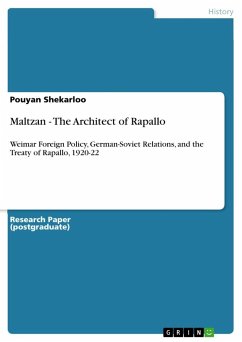Research Paper (postgraduate) from the year 2010 in the subject History of Germany - World War I, Weimar Republic, grade: 1, University of Washington (Department of History), course: Research Seminar in Modern European History, language: English, abstract: This paper does not aim to write a biography of Maltzan, nor does it claim to give a detailed account of his everyday business at the Auswärtiges Amt. What brought these two countries with such contradictory political, economical, and societal systems together? Who was responsible in the German foreign policy elite, and what exactly was the role of Ago von Maltzan? Does agency belong to him alone? The sources at hand are just too scarce. This article rather tries to analyze German-Soviet relations from 1920 to 1922 and highlight Maltzan's role and involvement in the process of this relationship. Maltzan as a diplomat at the headquarters of the Auswärtiges Amt was not always present in the public. He rather worked behind his desk or led backdoor negotiations with other diplomatic personnel. This paper will analyze German foreign policy towards Soviet Russia in the context of post-war European politics. It gives an analysis and interpretation of Maltzan's thoughts and ideas in analogy to political and diplomatic circumstances that occurred before and up to the Treaty of Rapallo. For the understanding of Maltzan, the history of German-Soviet relations is as important as the events that occurred at Rapallo.








